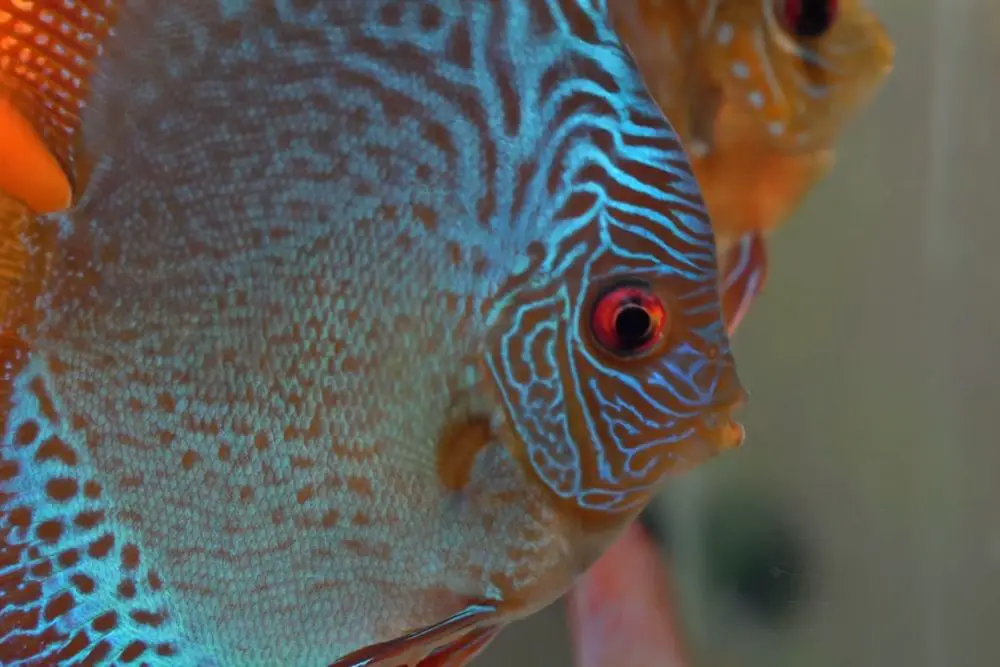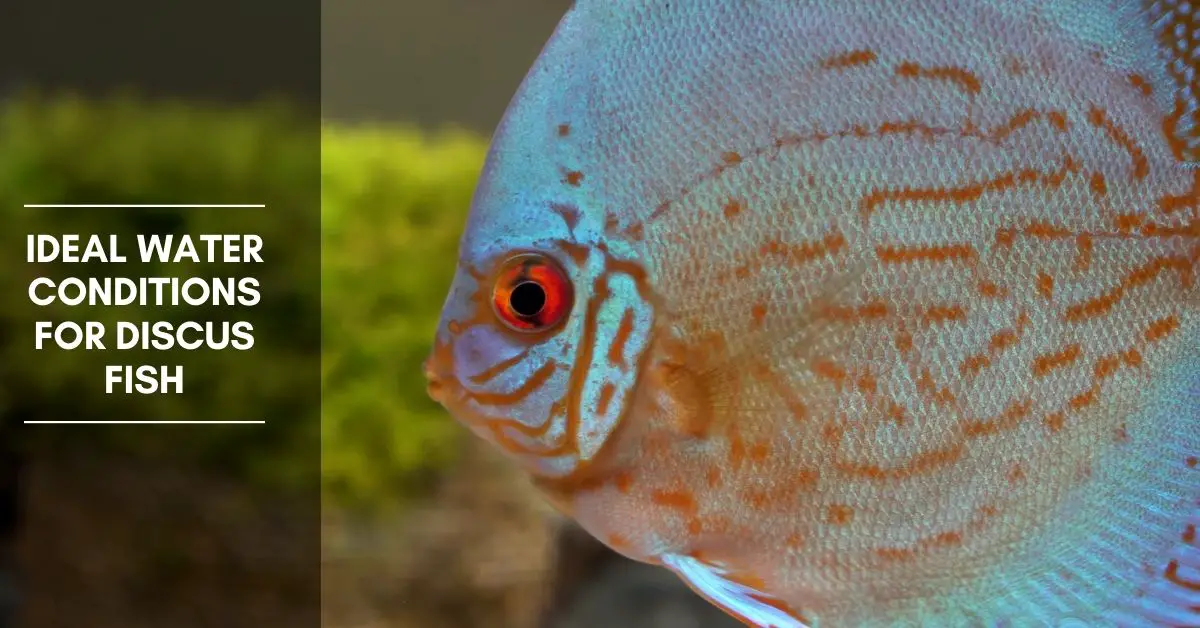In order for discus to thrive and develop properly, a well-planned aquarium set-up with good water parameters should be utilized. It is impractical to duplicate the backwaters of the South American rivers, but an adequate substitute can be provided.
Do discus need daily water changes?
Discus do exceptionally well with a frequent water change since changing the water helps destroy harmful bacteria and will increase the appetite of the fish. Removal of one-fourth of a tank of water each week is advised.
How to prepare the water?
Replace this with regular tap water. It is not necessary to age the water. The chlorine in the water dissipates in several hours. Be sure the replacement water is the same temperature as that of the tank or a couple of degrees higher.
Use different equipment in cleaning a community tank so that diseases cannot be transferred from one to the other. These water changes are especially desirable for young fish, since they will eat better and their intestines can function properly. Some mated pairs refuse to spawn unless given a water change.
Frequent water changes are beneficial for all fishes; not only harmful bacteria but also waste products are removed.
It is advisable to discover what chemicals are being added to the water in your area. Try to discover whether the amounts are variable. One day the authors lost nine adolescent blues because the water change had contained a higher amount of chlorine than usual because of a storm that had churned up muck in Lake Michigan.
Keeping the filters clean is important in maintaining a healthy discus tank. Corner filters are very effective, and an outside filter can be used in addition. Also periodically wash off any other items utilized in the tank as well as the sides.

What fish can live with discus?
Discus do not thrive well in community tanks. Many other fishes cannot tolerate the higher temperatures that discus prefer. They will also become a nuisance to the discus by quickly devouring the food and by swimming nervously in the tank.
Some fishes (a few of the barbs are good examples) will nip the fins of the discus. Angelfish blend beautifully with the discus to all appearances, but combining them is a mistake since angels can carry a worm (genus Capillaria) that can be fatal to a discus.
API STRESS COAT Aquarium Water Conditioner 16-Ounce Bottle
29% OffAPI STRESS ZYME Freshwater and Saltwater Aquarium Cleaning Solution 1-Ounce Bottle
13% OffAPI ACCU-CLEAR Freshwater Aquarium Water Clarifier 4-Ounce Bottle
18% OffPeaceful fishes such as Uaru and Corydoras can be good tank companions. If other fishes are to be used in the discus tanks, choose species that can thrive on higher temperatures and that are peaceful.
Optimal water temperature for Discus
The discus must be kept at a temperature range of 79°F to 84°F. or more. Heckels must be kept in waters from 85°F to 90°F since they come from warmer waters. The discus in their native habitat in South America live in slow-moving, soft, acid waters with a temperature of 79°F to 84°F degrees.
Often discus are captured in shaded creeks in which the water temperature is lower. However, these discus are usually skinny and have fin fungus. Discus are healthier in warmer water.
Can discus live in 78°F degrees or lower?
Never allow the temperature to drop below 79°F since this change will cause the discus to become sickly or to go on a hunger strike. An increase in temperature can break a hunger strike and is beneficial in treating the discus for worms.
Some breeders find that lowering the temperature to 79°F, will condition the female discus to develop eggs.
Discus fish water hardness and tds
Discus fare best in soft water, 1° to 4° dKH (18 to 70 ppm). This is the range in which they live in the Amazon waters of South America.
What should be tds in discus fish tank?
tds should be lower than 300 and lower for a breeding tank (soften the water with RO system).
What is the best pH needed for discus fish?
The pH should range between 6.0 and 6.5; that is, a slightly acid condition of the water. Pure peat moss can be added to the filter to achieve the desired acidity in the tank.
How to soften the water for discus fish?
A reverse osmosis unit is advisable here. The process known as reverse osmosis removes up to 98 percent of all dissolved substances from the water. Check this link for more information
In simple terms, the water is pressed through a special filter that holds back the dissolved substances. The less calcium and magnesium present in the water, the softer it is.
Reverse osmosis units for softening the water are attached to the faucet. However, the water then has so little salt that you have to mix it with some of the tap water before you can use it for your aquarium.
The mixing ratio depends on the hardness of the tap water and the desired hardness of the aquarium water.
What should be tank size for discus fish?
Thirty-gallon tanks can hold up to two dozen adolescent discus. As the fish reach maturity and choose a mate, however, it is best to place each ”pair” in a 20-gallon tank, which is the size recommended by most breeders. (Because of the water changes and temperature requirements, 50-gallon tanks are not practical.) Regardless of the size of the tank used, each tank should be equipped with a good fill-hood reflector.
Aquarium placement is quite important to the habits and temperament of the discus. Many discus keepers go to extremes and place their discus in a dark corner away from all other fish and people where no one can see or bother them.
Some pet shops place their discus tanks on very high racks where no one can tap on the glass, for example. The discus tank can be kept out in the open so long as it is in a relatively quiet surrounding.
The active pursuits of children, dogs, and cats should not be allowed near a discus tank. These actions will make the discus scared and nervous. Nothing should ever be thrown into the water, and quick movements should be avoided. It is best to keep the discus about four feet from the floor, thus enabling the fish to view a person fully.
It is necessary to keep the tank scrupulously clean from the moment it is utilized. Gravel and pebbles are very attractive but can be detrimental to the health of the discus.
Uneaten food and waste matter lodge in the gravel, unleashing bacteria and parasites. What a keeper gives up in appearances by not having gravel in the tank is made up for by increased ease of cleaning the tank. Artificial plants, especially the Amazon sword plant, are most suitable for decoration and can easily be removed and cleaned.

Hi, my name is Sean, and I’m the primary writer on the site. I’m blogging mostly about freshwater and saltwater aquariums, fish, invertebrates, and plants. I’m experienced in the fishkeeping hobby for many years. Over the years I have kept many tanks, and have recently begun getting more serious in wanting to become a professional aquarist. All my knowledge comes from experience and reading forums and a lot of informative sites. In pursuit of becoming a professional, I also want to inspire as many people as I can to pick up this hobby and keep the public interest growing.
Read more about Sean.
Please join also my Facebook group.




















